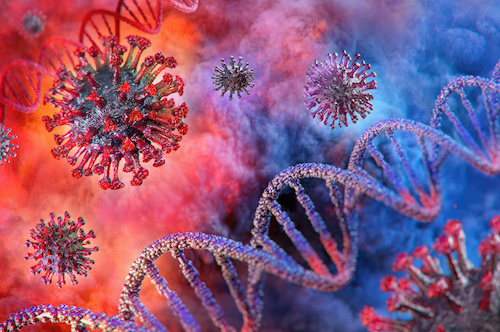People who consume more omega-3 fatty acids — particularly EPA and DHA — are less likely to suffer from severe Covid and/or require hospitalization from it, according to a study in The American Journal of Clinical Nutrition. They also have a reduced risk of testing positive for Covid, as well as dying from the virus.
Study Details
As part of the UK Biobank prospective cohort study, researchers examined three scenarios based on plasma DHA levels — testing positive for Covid; hospitalization from Covid; and dying from Covid. They used Nuclear Magnetic Resonance (NMR) spectroscopy to assess DHA levels; however, these were changed to the Omega-3 Index, which is red blood cell EPA plus DHA percentage. The cases were investigated between Jan. 2020 and March 2021.
Subjects with the highest Omega-3 Index levels were 21 percent less likely to test positive than those who consumed the lowest amount of omega-3 fatty acids and 26 percent less likely to require hospitalization than the low omega-3 subjects.
“This study confirms previous findings that low omega-3 status is associated with increased risk for hospitalization with COVID-19. We extended these findings by also showing reduced risk for testing positive with the infection and by providing evidence that the risk for death may also be reduced,” said Dr. William S. Harris, PhD, FASN, President, Fatty Acid Research Institute. “Furthermore, we identified the Omega-3 Index levels associated with the least (<4%) and greatest (>8%) protection from COVID-19. Altogether these results support the practice of increasing consumption of oily fish like salmon or omega-3 fish oil supplements as a potential risk reduction strategy when it comes to COVID-19.”
People in Korea and Japan eat more foods rich in omega-3 fatty acids compared to those in Western populations. Interestingly, the researchers note, the rates of severe Covid were lower in Korea and Japan.
Conclusion
“In conclusion, in this study, we confirmed the findings of previous investigations that a low n-3 status was associated with an increased risk of hospitalization with COVID-19. We extended these findings by also showing a reduced risk of testing positive with the virus and providing evidence that the risk of death may also be reduced. Furthermore, we identified the eO3I levels associated with the least (<4%) and greatest (>8%) protection from COVID-19. Taken together, these results suggest that increased intakes of n-3 (from oily fish and/or taking n-3 supplements) should be encouraged to increase the O3I and possibly reduce the risk of COVID-19 and perhaps other future pulmonary viral infections.”





